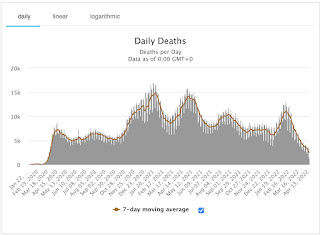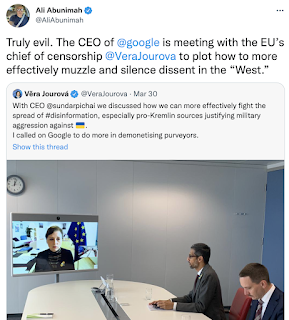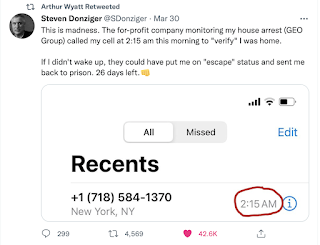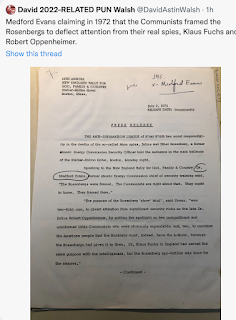Nelson Lowhim's Blog, page 26
April 19, 2022
Do you even podcast bro?

Enjoyed it? Share it via email, facebook, twitter, or one of the buttons below (or through some other method you prefer). Thank you! As always, here's the tip jar. paypal.me/nlowhim Throw some change in there & help cover the costs of running this thing. You can use paypal or a credit card.

April 17, 2022
Tower of Babel
And sure, Im of the mind that there's more to our being torn apart than just social media (inequality etc play into it), but the article has some good points. [1]
Second, the dart guns of social media give more power and voice to the political extremes while reducing the power and voice of the moderate majority. The “Hidden Tribes” study, by the pro-democracy group More in Common, surveyed 8,000 Americans in 2017 and 2018 and identified seven groups that shared beliefs and behaviors. The one furthest to the right, known as the “devoted conservatives,” comprised 6 percent of the U.S. population. The group furthest to the left, the “progressive activists,” comprised 8 percent of the population. The progressive activists were by far the most prolific group on social media: 70 percent had shared political content over the previous year. The devoted conservatives followed, at 56 percent.Think about that for a sec, then the conclusion to that:
These two extreme groups are similar in surprising ways. They are the whitest and richest of the seven groups, which suggests that America is being torn apart by a battle between two subsets of the elite who are not representative of the broader society. What’s more, they are the two groups that show the greatest homogeneity in their moral and political attitudes. This uniformity of opinion, the study’s authors speculate, is likely a result of thought-policing on social media: “Those who express sympathy for the views of opposing groups may experience backlash from their own cohort.” In other words, political extremists don’t just shoot darts at their enemies; they spend a lot of their ammunition targeting dissenters or nuanced thinkers on their own team. In this way, social media makes a political system based on compromise grind to a halt.
The article then mentions the rise in suicide and self harm among the youth. A problem to be sure. Hell, read this about suicide clusters in the Navy (just now!). Again, I don't doubt SM has a role, but other things are also at play, to include lack of trust in leadership or those in charge.
[1] The main one I've mentioned, being that they are all mainly racist at their core. Especially here in the US, but I've read about FB in India and how from the mods on down it helps the Brahmins over the oppressed in that country.
Enjoyed it? Share it via email, facebook, twitter, or one of the buttons below (or through some other method you prefer). Thank you! As always, here's the tip jar. paypal.me/nlowhim Throw some change in there & help cover the costs of running this thing. You can use paypal or a credit card.

April 16, 2022
Another short story

So it goes. CDC waste water not looking good, but masks off here, not even for inside. Sigh. Hopefully there's more sense if there's another spike. Don't bet on it. Looks like everyone's trying to forget instead of think it through, to include long covid. For now: Just enjoying this old school song with Busta.
Enjoyed it? Share it via email, facebook, twitter, or one of the buttons below (or through some other method you prefer). Thank you! As always, here's the tip jar. paypal.me/nlowhim Throw some change in there & help cover the costs of running this thing. You can use paypal or a credit card.

April 10, 2022
Some more good things.
As I've said here before, usually the search abroad for monsters to destroy is usually a result of wanting to distract us from our own failures. The article points out what that is:
Yeah, and this at a time when billions have been taken out of pandemic prep (for future one and helping alleviate this one by giving more to the rest of the world) by the GOP and moderate Dems. [1]
It is striking that so many people are anxious to wrongly blame the costs of China’s zero Covid policy on its rejection of U.S.-made mRNA vaccines. To my view, this reflects an incredibly wrongheaded view of medical technology and the pandemic, that has likely cost millions of lives and also substantially worsened inequality.
As I argued in the early days of the pandemic, the United States should have taken the lead in poolingresources worldwide in order to maximize innovation and the deployment of effective vaccines, tests, and treatments. Instead, it doubled down on government-granted patent monopolies as a mechanism for financing research.
Moderna is the main villain in this story. It was paid $483 million for developing its vaccine, then another $472 million to conduct its phase three clinical trials. It also got advance purchase agreements for hundreds of millions of doses at close to $20 a shot, if the vaccines were approved by the FDA. (The shot cost around $1.50 to manufacture and distribute.) Not surprisingly, with this amount of government support, Moderna had generated at least five new billionaires, as of last summer.
The riches that have gone to Moderna’s billionaires, and other well-placed executives and researchers there and at other drug companies, could have instead gone to items like expanding the child tax credit, or subsidies for day care. Alternatively, if we are worried about inflation from an over-stimulated economy, we could have reduced demand in the economy by not giving so much money to the drug industry.
Baker then goes on to show how the government is helping too many monopolies out there and exacerbate inequality. Again, I think this is brilliant point. The government is creating billionaires instead of helping billions (the latter being better for everyone involved, especially the gov). Really good analysis worth reading.
[1] Note that the China Covid 0 policy is not without its faults and I know the Current hit to the Econ is rough enough to have affected companies and their bottom line and make some Chinese want to move out (and here)
Enjoyed it? Share it via email, facebook, twitter, or one of the buttons below (or through some other method you prefer). Thank you! As always, here's the tip jar. paypal.me/nlowhim Throw some change in there & help cover the costs of running this thing. You can use paypal or a credit card.

April 9, 2022
To be wrong on the internet and be entertained.
So it goes.

Of course, on the internets, there are a million different shades of different things. This hero I never knew from 2013. What a boss. Find hope then destroy it. Or just disconnect and read. (so don't wait and read the above books).
[1] (and yeah I'm linking amazon here, even though I may be almost all gone in terms of Amazon and Audible having banned many of my books (no real reason given as of right now, which is nuts).
Enjoyed it? Share it via email, facebook, twitter, or one of the buttons below (or through some other method you prefer). Thank you! As always, here's the tip jar. paypal.me/nlowhim Throw some change in there & help cover the costs of running this thing. You can use paypal or a credit card.

April 6, 2022
The internet sucks. Until it doesn't.
One example is this thread. Brilliant stuff. I'm a fan of this comment by u/BeondTheGrave on the Vietnam war (not that I agree with everything here):
I think the author seems to underestimate the strength of the political factors still being played out by the Vietnam war actors (here in the US) and what that meant. The last bit I've heard from plenty of conservatives (blaming libs), and to say the least, how much evidence is there for this? Seems that from start to end there is little evidence (and most US assessments show that it was always in the South's interest to play like they could hold off the North with just a little more aid, just like with Afghanistan) for this. So I will have to read more on the matter.
It’s not my field per say, but it’s field adjacent for me.
I’ve been reading a whole bunch on the Vietnam War and in the last 10-15 years there has been a lot of movement reassessing and recontextualizing the war. Part of it is rereading old American sources without the partisan lens that infected so much of earlier histories. Old histories of the American War typical fall into one of two categories, the Orthodox school which adopts the views of (and also lionizes) the ‘68ers and the peace movement. The revisionist school, on the other hand, tries to tear down the ‘68ers. Mark Moyar’s Triumph Forsaken should tell you everything you need to know about the revisionists. But even more ‘neutral’ histories, such as HR McMaster’s Dereliction of Dutyor Lewis Sorely’s Westmoreland lean into alternating patterns of villainization and heroization. More recent works have moved past this binary, and have present a far more neutral view of the American war effort. A better understanding of what decisions were made when and by whom of course better fill out the narratives and undermine a lot of the claims of older scholarship.
More interesting, on the military side, is the work of Gregory Daddis. Old revisionist arguments were that William Westmoreland was a huge disaster, focusing on the body count and search and destroy even tho it didn’t work. His replacement, Creighton Abrams, came in and radically changed the war effort by shifting from search and destroy to pacification. This, they argue, worked and would have won the war but for the peaceniks who torpedoed the whole thing. You can also read shades of the Iraq war into this scholarship where the publication dates overlap. But in a pseudo-2 Vol history of the war, Daddis demonstrates that Westmoreland wasn’t as stupid or dull as many people say he was. Indeed his strategy was effective, and was deeper than just body counts. His aim was to establish security in the mountains so that ARVN and South Vietnam could build up the population centers (with American aid) on their own. Far from charting out a ‘better war,’ Abrams maintained many of the Westmoreland era policies. Abrams implemented US pacification in 1969, which was an expansion of a program begun by the US Marines and which Westmoreland wanted to spin out before Tet interrupted everything. Many revisionist scholars latch onto pacification, but then ignore that most US units stayed focused on fighting big unit battles and search and destroy missions. Another complication, Andrew Birtle shows that Abrams was far more creative at cooking statistics than implementing new strategies. This subtle data manipulation made it look like the war had changed and things were looking up while things didn’t actually change. What did change, as Daddis argues in his second book, is media coverage. On day one, before Abrams had even issued his first order, the AP ran a story about how Abrams changed the war and how things in Vietnam were better than ever. This continued through Abrams tenure, where the media had been suspicious of Westmorelands every word, they accepted Abrams and his funny data without question. According to Daddis this is the real origin of the Better War myth.
Further adding to this conversation is the new ‘internationalist’ school of scholarship. These bring in Polish sources, Chinese, and Soviet to show how those countries interacted with North Vietnamese and American actors. But even more exciting is the Vietnamese scholarship now being produced. For so long the story of the war, articulated by both the orthodox and revisionist schools, was that the war was an American tragedy. The emphasis is in American actions and American failure. But ultimately Vietnam was a civil war between two competing visions. Even without western backing, both sides would have at some point had to reconcile their futures. Scholarship on North Vietnam is much better developed, interestingly Vietnam is more free with their records than one might think. It’s possible of course to publish something that refutes the party line and gets a scholar banned, as apparently happened to Alec Holcombe when he published on the failure of collectivization and the famines of the late 1950s. There is too much to mention here, but incorporating North Vietnamese sources really changes our understanding of the war. In the west it was common to hear that the Vietnamese drove their strategy for western audiences, they fought battles to break public support in the US and fuel the peace movement. This is reinforced by the statement of a General like Giap, who we tend to see as the architect of the Vietnamese war, or the actions of North Vietnams own propaganda agencies. But really scholarship such as that by Pierre Asselin and Lien Hang Nguyen highlights that strategy in Hanoi wasn’t driven by a reading of western media, and sometimes not even battlefield realities, but by the dynamics of internal politics within the Communist party. Giap himself spent much of the war in semi-exile having been purged during the rise of Le Duan. These internal struggles tend to correspond well to renewed offensive. Really you cannot understand the war without understanding politics in the north.
The last great gap in scholarship is with the South. One unfortunate tendency of recent scholarship is to overbalance the US and North Vietnamese positions and to say “well the weak link must be South Vietnam, they lost the war.” But in my opinion that’s more of a cop out, a limitation of scholars aperture, rather than the reality. Interestingly most of the South Vietnamese archives were captured in 1975 intact. AFAIK they were moved to Hanoi but otherwise have been unchanged and, mostly, unused. Some of these records are quite detailed regarding political organization and internal assessments of the war effort. While poorly explored and understood, the little I’ve read that has come out of these archives really contradicts many American narratives of South Vietnam and ARVN. Some documents highlight that the GVN was far more popular, especially after Tet, than previously thought. Tet and the battle of Hue, specifically the mass murders and executions carried out amongst Southern student activists during the first days of the battle, galvanized support against the Communists. It helps to explain why the southern arm of the Vietcong was destroyed and never rebuilt (with southern manpower) after Tet. People didn’t want them to win.
The sole author I know of who has made extensive use of these sources is George Veith, whose two most recent books focus heavily on the southern government. The conventional narrative here is that the South after Diem was a carousel of dictators, none enjoying popular support and all embracing corruption. This filtered down to ARVN which was too corrupt and disillusioned to fight hard for the regime. That’s true before Tet, but Veith and others highlight that, basically, Vietnamization worked. As ARVN replaced US troops, they were forced to adjust into a more traditional and professional military. And Nguyen Van Thieu provided stability in the political realm, eh controlled the system for almost eight years and worked hard to protect his, basically, dictatorial regime. All this culminates in the mid 1970s. In 1972 the Easter Offensive (I believe 50 years this month actually) badly shook ARVN, but it also forced many of the political generals to resign and for soldiers to take over. There are also interesting conclusions that the field out to be taking note of regarding the changing nature of the war that I think, to this point, has been ignored.That offensive revealed that, when backed up by US air power, ARVN fought well and fought hard. Vieth argues that after ‘72 South Vietnam was in a pretty strong military position, with air power it could stop an NVA offensive on the ground by itself. It was dependent, though, on US aid. The Paris Peace Accords ended the U.S. war, but did little to stop the war in Vietnam (Asselin’s book in the Accords also reevaluates the role of strategic bombing in drafting the accords and suggests the Christmas attacks were probably more effective and decisive than we give credit). What the Peace Accords did though was let Washington forget about Vietnam. The first thing cut from the budget in the era of the ‘Peace Dividend’ was material aid to ARVN. First domestic air power was cut and the transfer of fighters canceled, then even basic necessities like artillery shells and bullets were restricted. This had tangible effects on ARVN battlefield performance, several NVA offensives in the Delta region obtained far more success than Saigon wanted, or Hanoi expected, and according to Veith was the result of ammunition shortages more than battlefield failure. They also emboldened Hanoi to try another knockout blow. By 1975 ARVN basically had nothing in reserve, it had been sucked dry already fighting off smaller incursions. What they had, they employed aggressively and successfully. Probably with material support and bombings ‘75 would have went the same way as ‘72. But US support never came, and after two periods of intense resistance ARVN collapsed. But this narrative is so provocative because it totally upends our understanding of when and why the war was lost. If it’s really the case that ARVN just needed material support and air power, what does that say about the successes and failures of what came before? I think one could draw a very interesting parallel here to the US war for Iraq, which is why the comparison with Afghanistan recently has frustrated me.
Thoughts? Good books to read on the matter?
Enjoyed it? Share it via email, facebook, twitter, or one of the buttons below (or through some other method you prefer). Thank you! As always, here's the tip jar. paypal.me/nlowhim Throw some change in there & help cover the costs of running this thing. You can use paypal or a credit card.

April 4, 2022
Republic of False Truths.
Enjoyed it? Share it via email, facebook, twitter, or one of the buttons below (or through some other method you prefer). Thank you! As always, here's the tip jar. paypal.me/nlowhim Throw some change in there & help cover the costs of running this thing. You can use paypal or a credit card.

March 31, 2022
Okay, the internets are trying to teach me to stop worrying and love conspiracies.
Again, this doesn't mean I'm pro-Russia, just pointing out the hypocrisy in many people's statements and refugee policies. But that means you are possibly slowing down the internet scream for this thing and thus people are getting shut down. Some people think it's a big alignment moment. I'm sensing the same thing too.

 Genuinely think that big Tech's censorship is now getting online with the MSM in terms of blocking the left (Chris Hedges being one).
Genuinely think that big Tech's censorship is now getting online with the MSM in terms of blocking the left (Chris Hedges being one).  All right, this guy above, a totally legit lawyer, being railroaded by our corrupt judicial system for going after a fossil fuel company. 😱 Stuff like this was happening before Ukraine, of course, and you never heard anything about it from our MSM. Similar to Assange and how his case is truly one about freedom of speech.
All right, this guy above, a totally legit lawyer, being railroaded by our corrupt judicial system for going after a fossil fuel company. 😱 Stuff like this was happening before Ukraine, of course, and you never heard anything about it from our MSM. Similar to Assange and how his case is truly one about freedom of speech. Random aside: here's some stuff on Rosenbergs framing as Commie plot:

Enjoyed it? Share it via email, facebook, twitter, or one of the buttons below (or through some other method you prefer). Thank you! As always, here's the tip jar. paypal.me/nlowhim Throw some change in there & help cover the costs of running this thing. You can use paypal or a credit card.

Lol, 😂 wtf. Kids these days

Enjoyed it? Share it via email, facebook, twitter, or one of the buttons below (or through some other method you prefer). Thank you! As always, here's the tip jar. paypal.me/nlowhim Throw some change in there & help cover the costs of running this thing. You can use paypal or a credit card.

March 30, 2022
Revolution Betrayed
Enjoyed it? Share it via email, facebook, twitter, or one of the buttons below (or through some other method you prefer). Thank you! As always, here's the tip jar. paypal.me/nlowhim Throw some change in there & help cover the costs of running this thing. You can use paypal or a credit card.

Nelson Lowhim's Blog
- Nelson Lowhim's profile
- 14 followers



